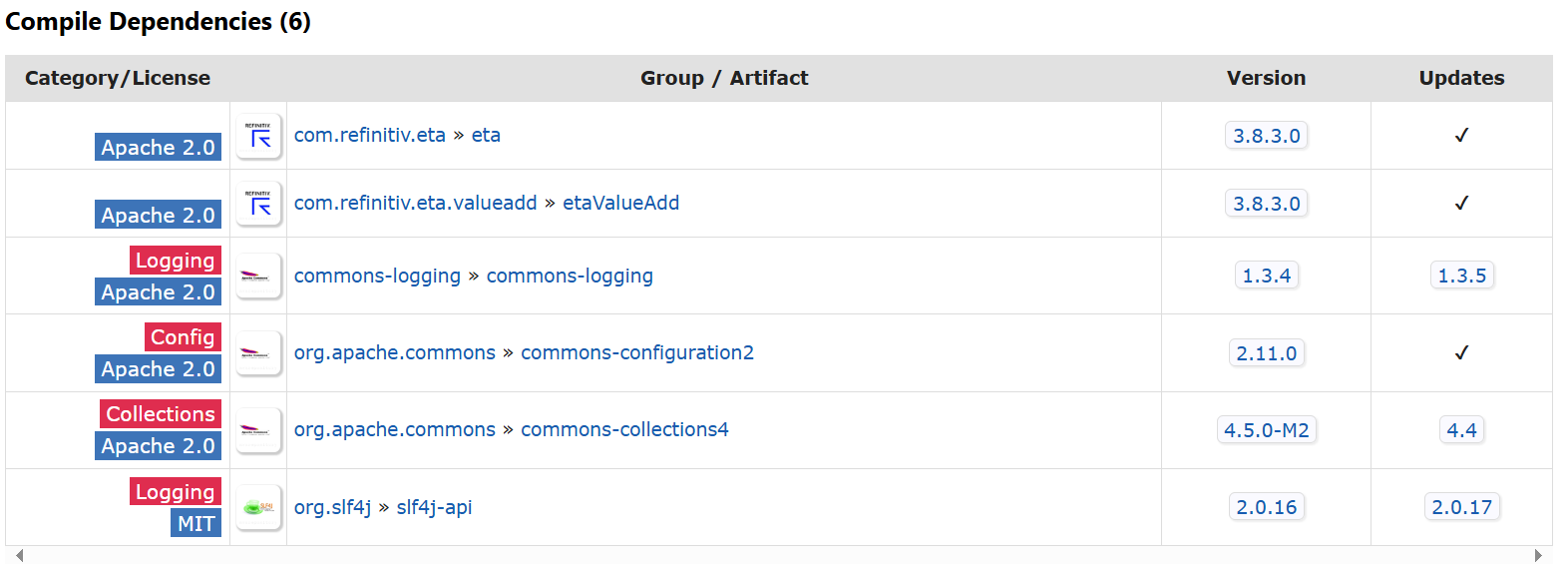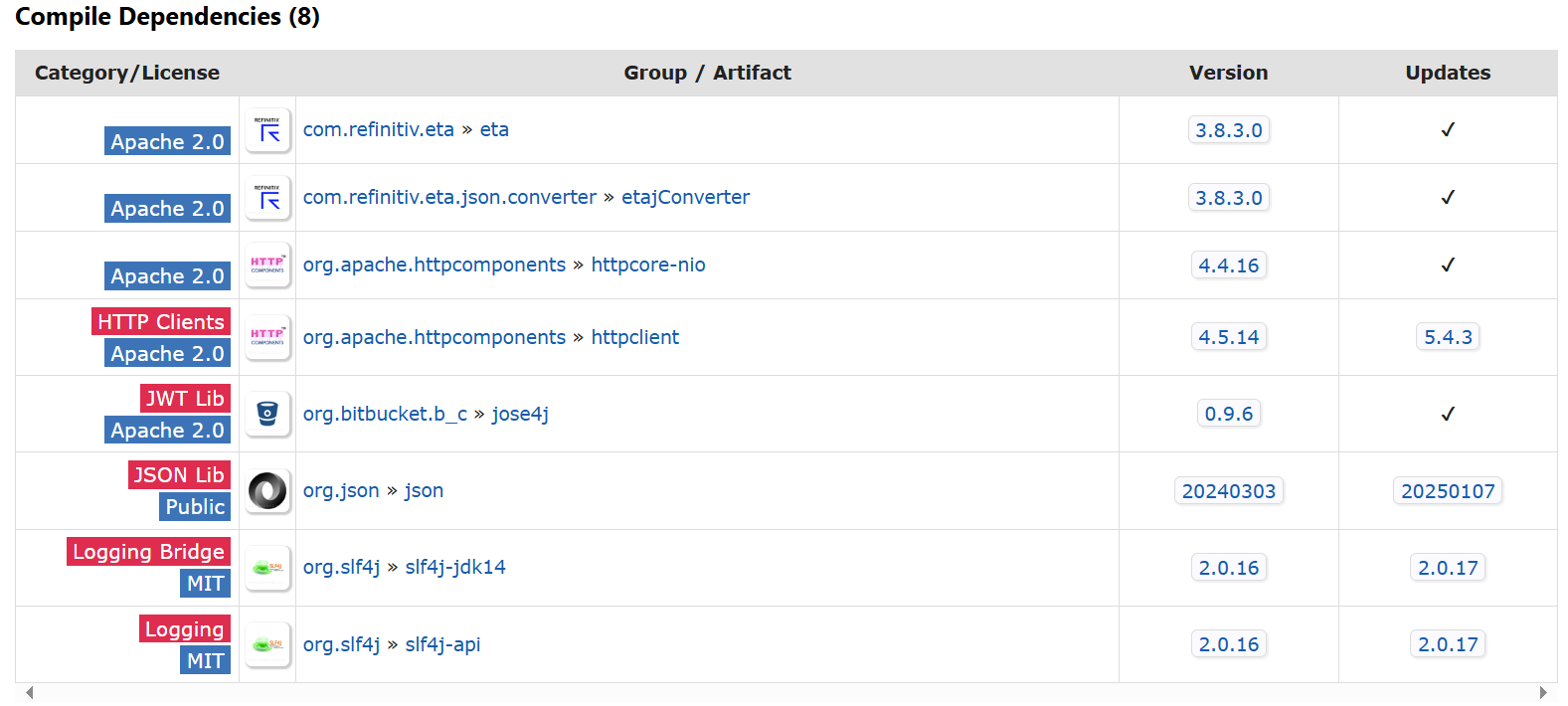
Last Updated: March 2025
This article is an update version of my old article because that library and configuration are outdated. This updated article has been revised to use up-to-date EMA, SLF4J, and Log4J2 libraries (as of March 2025)
The Enterprise Message API - Java Edition (EMA API) (formerly known as Elektron Message API) implements the logging mechanism with the Simple Logging Facade for Java (SLF4J) as a facade for logging utility and bind it to the Java Logging API as a default logger. The usage of SLF4J allows developers integrate the EMA Java application with other Logging APIs like a de facto standard logging framework for Java-based application Apache Log4j2 at deployment time.
The EMA API Java edition has been mavenized to support Apache Maven and Gradle build tools since Real-Time SDK Java (formerly known as Elektron SDK) version 1.2, therefore this article will show how to integrate your EMA Java 2.x application with Log4j2 using Maven.
As of December 2021: There are new serious vulnerabilities that were identified impacting the Apache Log4j utility. Please update the library to the latest version. You can find more detail regarding the vulnerability and the fix from the Apache Log4j Security Vulnerabilities page.
Introduction to SLF4J
Let’s start with overview of SLF4J framework. SLF4J or Simple Logging Facade for Java (SLF4J) serves as a simple facade or abstraction for various logging frameworks such as java.util.logging, logback, log4j2, etc. allowing the end user to plug in the desired logging framework at deployment time.
Introduction to Log4J version 2
As part of Apache Logging Services, Apache Log4j is a Java-based logging framework. It is versatile, industrial-grade framework that has been widely-used by developers for both open-source and enterprise projects.
Log4j is one of the first logging framework on Java.
That’s all I have to say about the logging framework.
Prerequisite
Before I am going further, there is some prerequisite, dependencies, and libraries that the EMA Java and Log4J are needed.
Internet Access
The EMA Java library is also available on the Maven Central repository.
This project downloads the EMA libraries over internet to build and run applications.
Java SDK
For the Java project, you need Java SDK version 11, 17, or 21 (either Oracle JDK or OpenJDK). Please see more detail on the API Compatibility Matrix and SDK README pages.
Apache Maven
The Java project uses Apache Maven as a project build automation tool.
That covers the prerequisite of this project.
How to integrate EMA Java Application with Logging Framework in Maven
Moving on to EMA and Maven configuration. The Real-Time SDK Java is now available in Maven Central Repository. You can define the following dependency in Maven's pom.xml file to let Maven automatically download the EMA Java library and ETA Java library for an application.
<properties>
<maven.compiler.source>11</maven.compiler.source>
<maven.compiler.target>11</maven.compiler.target>
<rtsdk.version>3.8.3.0</rtsdk.version>
</properties>
<dependencies>
<dependency>
<groupId>com.refinitiv.ema</groupId>
<artifactId>ema</artifactId>
<version>${rtsdk.version}</version>
</dependency>
</dependencies>
Note:
- This article is based on EMA Java version 3.8.3 (RTSDK Java Edition 2.2.3 L1). You can change the library version in <version> configuration to match your project.
- Please be noticed that I use the Maven variables <rtsdk.version>3.8.3.0</rtsdk.version> to set the library version in a single place in the pom.xml file.
Since RTSDK 1.5.1, The EMA uses ETA Java ValueAdd API to bind the SLF4J logging mechanism with Java Logging API as a default logger instead of the EMA API itself (the previous versions EMA API binds SLF4J-Java Logging API directly). When developers add the ema library dependency in a Maven pom.xml file, EMA automatically downloads the etaValueAdd library which also downloads the slf4j-api and slf4j-jdk14 libraries for an application too.


Developers can perform the following steps to integrate the EMA Java Maven application log with Log4j framework.
- Configure pom.xml file's EMA dependency declaration to not load slf4j-jdk14 library.
- Add SLF4J-Log4j and Log4j dependencies in pom.xml file (see Installing SLF4J-to-Log4j bridge page).
- Configure Log4j configurations file to Java classpath or JVM option.
Maven pom.xml setting for EMA Java and Log4j
Developers can configure the EMA dependency declaration in the pom.xml file to exclude the SLF4J-JDK14 library using Maven Dependency Exclusions feature.
<dependency>
<groupId>com.refinitiv.ema</groupId>
<artifactId>ema</artifactId>
<version>${rtsdk.version}</version>
<exclusions>
<exclusion>
<groupId>org.slf4j</groupId>
<artifactId>slf4j-jdk14</artifactId>
</exclusion>
</exclusions>
</dependency>
The Log4j 2 framework requires the following dependencies to integrate with SLF4J framework.
- log4j-api
- log4j-core
- log4j-slf4j2-impl (Note, EMA 3.8.3 uses SLF4J version 2.0.16, that is why you need the log4j-slf4j2-impl library)
The dependencies above can be configured in the pom.xml file.
<properties>
<project.build.sourceEncoding>UTF-8</project.build.sourceEncoding>
<maven.compiler.source>11</maven.compiler.source>
<maven.compiler.target>11</maven.compiler.target>
<rtsdk.version>3.8.3.0</rtsdk.version>
<log4j.version>2.24.3</log4j.version>
</properties>
<dependencies>
<dependency>
<groupId>org.apache.logging.log4j</groupId>
<artifactId>log4j-api</artifactId>
<version>${log4j.version}</version>
</dependency>
<dependency>
<groupId>org.apache.logging.log4j</groupId>
<artifactId>log4j-core</artifactId>
<version>${log4j.version}</version>
</dependency>
<dependency>
<groupId>org.apache.logging.log4j</groupId>
<artifactId>log4j-slf4j2-impl</artifactId>
<version>${log4j.version}</version>
</dependency>
</dependencies>
Note: You can change the library version in <version> configuration to match your project.
That covers the EMA and Maven configuration.
Example Log4j 2 configurations file
That brings us to the Log4j configuration. The example of Log4j 2 configuration file for EMA Java application is the following.
<?xml version="1.0" encoding="UTF-8"?>
<Configuration>
<Appenders>
<Console name="Console" target="SYSTEM_OUT">
<PatternLayout pattern="current date-%d LEVEL-%-5p Thread-[%t] Method-%M() Class name-%C Message-%m%n"/>
</Console>
<File name="File" fileName="logs/ema_log4j.log" immediateFlush="false" append="false">
<PatternLayout pattern="current date-%d LEVEL-%-5p Thread-[%t] Method-%M() Class name-%C Message-%m%n"/>
</File>
</Appenders>
<loggers>
<Logger name="com.refinitiv.ema" level="TRACE"/>
<root level="TRACE">
<appender-ref ref="Console"/>
<appender-ref ref="File"/>
</root>
</loggers>
</Configuration>
The configurations example file above sets the Log4j to print all EMA Java API (com.refinitiv.ema package) logs messages to console and ema_log4j.log log file. Please find a full detail of Log4j configuration parameters in Log4j manual page.
EMA Java applications and Log4j Code Walkthrough
Now we come to the demo applications code walkthrough. The demo applications are the EMA Java Consumer application connects to the EMA Java IProvider application via the RSSL connection. Both applications use SLF4J's logger.info() and logger.error() methods in the source codes to log the application messages instead of System.out.println() method like the following example codes.
EMA Java IProvider Code:
import org.slf4j.Logger;
import org.slf4j.LoggerFactory;
public class IProvider_App {
private static final Logger logger = LoggerFactory.getLogger(IProvider_App.class);
public static void main(String[] args) {
//BasicConfigurator.configure();
OmmProvider provider = null;
try {
logger.info("Starting IProvider_App application, waiting for a consumer application");
AppClient appClient = new AppClient();
FieldList fieldList = EmaFactory.createFieldList();
UpdateMsg updateMsg = EmaFactory.createUpdateMsg();
provider = EmaFactory.createOmmProvider(EmaFactory.createOmmIProviderConfig()
.operationModel(OmmIProviderConfig.OperationModel.USER_DISPATCH), appClient);
....
} catch (OmmException | InterruptedException excp) {
logger.error(excp.getMessage());
} finally {
if (provider != null)
provider.uninitialize();
}
}
}
class AppClient implements OmmProviderClient {
private static final Logger logger = LoggerFactory.getLogger(AppClient.class);
...
void processLoginRequest(ReqMsg reqMsg, OmmProviderEvent event) {
logger.info("IProvider_App.AppClient: Received Consumer Login Request Message");
event.provider()
.submit(...);
logger.info("IProvider_App.AppClient: Sent Login Refresh message");
}
void processMarketPriceRequest(ReqMsg reqMsg, OmmProviderEvent event) {
if (itemHandle != 0) {
processInvalidItemRequest(reqMsg, event);
return;
}
FieldList fieldList = EmaFactory.createFieldList();
fieldList.add(EmaFactory.createFieldEntry().ascii(3, reqMsg.name()));
fieldList.add(EmaFactory.createFieldEntry().enumValue(15, 840));
fieldList.add(EmaFactory.createFieldEntry().real(21, 3900, OmmReal.MagnitudeType.EXPONENT_NEG_2));
...
event.provider().submit(...);
logger.info("IProvider_App.AppClient: Sent Market Price Refresh messages");
itemHandle = event.handle();
}
}
EMA Java Consumer Code:
import org.slf4j.Logger;
import org.slf4j.LoggerFactory;
public class Consumer_App {
private static final Logger logger = LoggerFactory.getLogger(Consumer_App.class);
public static void main(String[] args) {
OmmConsumer consumer = null;
String service_name = "ELEKTRON_DD";
try {
logger.info("Starting Consumer_App application");
AppClient appClient = new AppClient();
consumer = EmaFactory.createOmmConsumer(EmaFactory.createOmmConsumerConfig().consumerName("Consumer_1"));
ReqMsg reqMsg = EmaFactory.createReqMsg();
logger.info("Consumer_App: Register Login stream");
consumer.registerClient(reqMsg.domainType(EmaRdm.MMT_LOGIN), appClient);
...
logger.info("Consumer_App: Send item request message");
consumer.registerClient(reqMsg.clear().serviceName(service_name).name("/EUR="), appClient);
Thread.sleep(60000); // API calls onRefreshMsg(), onUpdateMsg() and onStatusMsg()
} catch (InterruptedException | OmmException excp) {
logger.error(excp.getMessage());
} finally {
if (consumer != null)
consumer.uninitialize();
}
}
}
class AppClient implements OmmConsumerClient {
private static final Logger logger = LoggerFactory.getLogger(AppClient.class);
public void onRefreshMsg(RefreshMsg refreshMsg, OmmConsumerEvent event) {
logger.info("Consumer_App.AppClient: Receives Market Price Refresh message");
logger.info(String.format("Item Name: %s", refreshMsg.hasName() ? refreshMsg.name() : "<not set>"));
logger.info(String.format("Service Name: %s",refreshMsg.hasServiceName() ? refreshMsg.serviceName() : "<not set>"));
logger.info(String.format("Item State: %s", refreshMsg.state()));
logger.info(String.format("%s",refreshMsg));
logger.info("\n");
}
...
}
Then Log4j will do the rest for an application based on the log4j2.xml configuration file.
Log4j configurations file
My next point is our log4j2.xml configuration file. The demo applications separate an application log and EMA Java API log messages to consoles and log files.
- The IProvider_App application messages are printed in console and provider_log4j.log file.
- The Consumer_App application messages are printed in console and consumer_log4j.log file.
- The EMA Java API logs from both applications are printed in ema_log4j.log file.
The log4j2.xml file detail is as follows.
<?xml version="1.0" encoding="UTF-8"?>
<!--<Configuration status="DEBUG">-->
<Configuration xmlns="https://logging.apache.org/xml/ns"
xmlns:xsi="http://www.w3.org/2001/XMLSchema-instance"
xsi:schemaLocation="
https://logging.apache.org/xml/ns
https://logging.apache.org/xml/ns/log4j-config-2.xsd">
<Appenders>
<Console name="LogToConsole" target="SYSTEM_OUT">
<PatternLayout pattern="%d Class name-%C Message-%m%n"/>
</Console>
<File name="emaLogFile" fileName="logs/ema_log4j.log">
<PatternLayout pattern="%d LEVEL-%-5p Thread-[%t] Method-%M() Class name-%C Message-%m%n"/>
</File>
<File name="consumerLogFile" fileName="logs/consumer_log4j.log">
<PatternLayout pattern="%d{HH:mm:ss.SSS} [%t] %-5level %logger{36} - %msg%n"/>
</File>
<File name="providerLogFile" fileName="logs/provider_log4j.log">
<PatternLayout pattern="%d{HH:mm:ss.SSS} [%t] %-5level %logger{36} - %msg%n"/>
</File>
</Appenders>
<Loggers>
<!-- avoid duplicated logs with additivity=false additivity="false" -->
<Logger name="com.refinitiv.ema" level="TRACE" additivity="false" >
<AppenderRef ref="emaLogFile" />
</Logger>
<Logger name="com.refinitiv.ema.consumer" level="INFO" additivity="false">
<AppenderRef ref="LogToConsole"/>
<AppenderRef ref="consumerLogFile"/>
</Logger>
<Logger name="com.refinitiv.ema.provider" level="INFO" additivity="false">
<AppenderRef ref="LogToConsole"/>
<AppenderRef ref="providerLogFile"/>
</Logger>
</Loggers>
</Configuration>
Running the application with Log4j configuration
So, now let’s look at how to run an application with Log4j configuration. To uses Log4j configurations file, developers can add the Log4j configurations file to the Java classpath or set the JVM option -Dlog4j2.configurationFile points to the log4j2.xml file at runtime. Please note that if you do not build the application into a single-all-dependencies jar file, you need to include the Log4j 2 libraries files in the Java classpath too.
Example command:
java -Dlog4j2.configurationFile=resources/log4j2.xml -jar target/rtsdk223L1_maven-1.0-SNAPSHOT-jar-with-dependencies.jar
That’s all I have to say about how to run an application with the Logj42 configuration file.
Example Applications Results
Consumer_App result
07:10:48.600 [main] INFO com.refinitiv.ema.consumer.Consumer_App - Starting Consumer_App application
07:10:53.810 [main] INFO com.refinitiv.ema.consumer.Consumer_App - Consumer_App: Register Login stream
07:10:53.813 [main] INFO com.refinitiv.ema.consumer.Consumer_App - Consumer_App: Register Directory stream
07:10:53.813 [pool-3-thread-1] INFO com.refinitiv.ema.consumer.AppClient - Consumer_App.AppClient: Receives Market Price Refresh message
07:10:53.815 [pool-3-thread-1] INFO com.refinitiv.ema.consumer.AppClient - Item Name: root
07:10:53.815 [pool-3-thread-1] INFO com.refinitiv.ema.consumer.AppClient - Service Name: <not set>
07:10:53.816 [pool-3-thread-1] INFO com.refinitiv.ema.consumer.AppClient - Item State: Open / Ok / None / 'Login accepted'
07:10:53.817 [pool-3-thread-1] INFO com.refinitiv.ema.consumer.AppClient - RefreshMsg
streamId="1"
domain="Login Domain"
solicited
RefreshComplete
state="Open / Ok / None / 'Login accepted'"
itemGroup="00 00"
name="root"
nameType="1"
Attrib dataType="ElementList"
ElementList
ElementListEnd
AttribEnd
RefreshMsgEnd
07:10:53.818 [pool-3-thread-1] INFO com.refinitiv.ema.consumer.AppClient -
07:10:53.821 [main] INFO com.refinitiv.ema.consumer.Consumer_App - Consumer_App: Send item request message
07:10:53.823 [pool-3-thread-1] INFO com.refinitiv.ema.consumer.AppClient - Consumer_App.AppClient: Receives Market Price Refresh message
07:10:53.824 [pool-3-thread-1] INFO com.refinitiv.ema.consumer.AppClient - Item Name: <not set>
07:10:53.825 [pool-3-thread-1] INFO com.refinitiv.ema.consumer.AppClient - Service Name: <not set>
07:10:53.825 [pool-3-thread-1] INFO com.refinitiv.ema.consumer.AppClient - Item State: Open / Ok / None / ''
07:10:53.829 [pool-3-thread-1] INFO com.refinitiv.ema.consumer.AppClient - RefreshMsg
streamId="5"
domain="Directory Domain"
solicited
RefreshComplete
state="Open / Ok / None / ''"
itemGroup="00 00"
filter="0"
Payload dataType="Map"
Map
MapEntry action="Add" key dataType="UInt" value="1" dataType="FilterList"
FilterList
FilterEntry action="Set" filterId="1 dataType="ElementList"
ElementList
ElementEntry name="Name" dataType="Ascii" value="ELEKTRON_DD"
....
ElementEntry name="AcceptingConsumerStatus" dataType="UInt" value="0"
ElementListEnd
FilterEntryEnd
FilterEntry action="Set" filterId="2 dataType="ElementList"
ElementList
ElementEntry name="ServiceState" dataType="UInt" value="1"
ElementEntry name="AcceptingRequests" dataType="UInt" value="1"
ElementListEnd
FilterEntryEnd
FilterListEnd
MapEntryEnd
MapEnd
PayloadEnd
RefreshMsgEnd
07:10:53.830 [pool-3-thread-1] INFO com.refinitiv.ema.consumer.AppClient -
07:10:54.758 [pool-3-thread-1] INFO com.refinitiv.ema.consumer.AppClient - Consumer_App.AppClient: Receives Market Price Refresh message
07:10:54.759 [pool-3-thread-1] INFO com.refinitiv.ema.consumer.AppClient - Item Name: /EUR=
07:10:54.759 [pool-3-thread-1] INFO com.refinitiv.ema.consumer.AppClient - Service Name: ELEKTRON_DD
07:10:54.760 [pool-3-thread-1] INFO com.refinitiv.ema.consumer.AppClient - Item State: Open / Ok / None / 'Refresh Completed'
07:10:54.763 [pool-3-thread-1] INFO com.refinitiv.ema.consumer.AppClient - RefreshMsg
streamId="6"
domain="MarketPrice Domain"
solicited
RefreshComplete
state="Open / Ok / None / 'Refresh Completed'"
itemGroup="00 00"
name="/EUR="
serviceId="1"
serviceName="ELEKTRON_DD"
Payload dataType="FieldList"
FieldList
FieldEntry fid="3" name="DSPLY_NAME" dataType="Rmtes" value="/EUR="
FieldEntry fid="15" name="CURRENCY" dataType="Enum" value="840"
FieldEntry fid="21" name="HST_CLOSE" dataType="Real" value="39.00"
FieldEntry fid="22" name="BID" dataType="Real" value="39.90"
FieldEntry fid="25" name="ASK" dataType="Real" value="39.94"
FieldEntry fid="30" name="BIDSIZE" dataType="Real" value="9.0"
FieldEntry fid="31" name="ASKSIZE" dataType="Real" value="19.0"
FieldListEnd
PayloadEnd
RefreshMsgEnd
07:10:54.763 [pool-3-thread-1] INFO com.refinitiv.ema.consumer.AppClient -
07:10:55.760 [pool-3-thread-1] INFO com.refinitiv.ema.consumer.AppClient - Consumer_App.AppClient: Receives Market Price Update message
07:10:55.764 [pool-3-thread-1] INFO com.refinitiv.ema.consumer.AppClient - Item Name: /EUR=
07:10:55.766 [pool-3-thread-1] INFO com.refinitiv.ema.consumer.AppClient - Service Name: ELEKTRON_DD
07:10:55.768 [pool-3-thread-1] INFO com.refinitiv.ema.consumer.AppClient - UpdateMsg
streamId="6"
domain="MarketPrice Domain"
updateTypeNum="0"
name="/EUR="
serviceId="1"
serviceName="ELEKTRON_DD"
Payload dataType="FieldList"
FieldList
FieldEntry fid="22" name="BID" dataType="Real" value="39.91"
FieldEntry fid="25" name="ASK" dataType="Real" value="39.94"
FieldEntry fid="30" name="BIDSIZE" dataType="Real" value="10.0"
FieldEntry fid="31" name="ASKSIZE" dataType="Real" value="19.0"
FieldListEnd
PayloadEnd
UpdateMsgEnd
IProvider_App result
07:10:48.565 [main] INFO com.refinitiv.ema.provider.IProvider_App - Starting IProvider_App application, waiting for a consumer application
07:10:51.624 [main] INFO com.refinitiv.ema.provider.AppClient - IProvider_App.AppClient: Received Consumer Login Request Message
07:10:51.630 [main] INFO com.refinitiv.ema.provider.AppClient - IProvider_App.AppClient: Sent Login Refresh message
07:10:54.754 [main] INFO com.refinitiv.ema.provider.AppClient - IProvider_App.AppClient: Received Market Price Item Request message
07:10:54.757 [main] INFO com.refinitiv.ema.provider.AppClient - IProvider_App.AppClient: Sent Market Price Refresh message
07:10:55.759 [main] INFO com.refinitiv.ema.provider.IProvider_App - IProvider_App: Sent Market Price Update message
07:10:56.761 [main] INFO com.refinitiv.ema.provider.IProvider_App - IProvider_App: Sent Market Price Update message
07:10:57.763 [main] INFO com.refinitiv.ema.provider.IProvider_App - IProvider_App: Sent Market Price Update message
07:10:58.764 [main] INFO com.refinitiv.ema.provider.IProvider_App - IProvider_App: Sent Market Price Update message
07:10:59.766 [main] INFO com.refinitiv.ema.provider.IProvider_App - IProvider_App: Sent Market Price Update message
EMA Java result
EMA Java log messages from both demo applications will be in ema_log4j.log file.
2025-03-28 07:10:48,850 LEVEL-TRACE Thread-[main] Method-initialize() Class name-com.refinitiv.ema.access.OmmBaseImpl Message-loggerMsg
ClientName: Consumer_1_1
Severity: Trace
Text: Print out active configuration detail.
itemCountHint: 100000
serviceCountHint: 513
requestTimeout: 15000
dispatchTimeoutApiThread: 0
maxDispatchCountApiThread: 100
...
restProxyPort: null
sessionEnhancedItemRecovery: true
loggerMsgEnd
2025-03-28 07:10:48,868 LEVEL-TRACE Thread-[main] Method-initialize() Class name-com.refinitiv.ema.access.OmmBaseImpl Message-loggerMsg
ClientName: Consumer_1_1
Severity: Trace
Text: Successfully open Selector.
loggerMsgEnd
....
2025-03-28 07:10:49,413 LEVEL-TRACE Thread-[main] Method-initialize() Class name-com.refinitiv.ema.access.OmmServerBaseImpl Message-loggerMsg
ClientName: Provider_1_1
Severity: Trace
Text: Print out active configuration detail.
itemCountHint: 10000
serviceCountHint: 10000
requestTimeout: 15000
dispatchTimeoutApiThread: 500
maxDispatchCountApiThread: 500
maxDispatchCountUserThread: 500
...
maxFieldDictFragmentSize: 8192
maxEnumTypeFragmentSize: 12800
loggerMsgEnd
2025-03-28 07:10:49,419 LEVEL-TRACE Thread-[main] Method-initialize() Class name-com.refinitiv.ema.access.OmmServerBaseImpl Message-loggerMsg
ClientName: Provider_1_1
Severity: Trace
Text: Successfully open Selector.
loggerMsgEnd
2025-03-28 07:10:49,439 LEVEL-TRACE Thread-[main] Method-initialize() Class name-com.refinitiv.ema.access.OmmServerBaseImpl Message-loggerMsg
ClientName: Provider_1_1
Severity: Trace
Text: Successfully created Reactor.
loggerMsgEnd
...
Conclusion
The EMA Java API is implemented on top of SLF4J API as a facade for logging utility. The latest version of API allows developers to integrate EMA Java application with the preferred Logging framework by changing the repository, dependencies via their Java project management (Maven or Gradle), and then set the log configuration files without touching the application source code.
That covers all I wanted to say today.
References
For further details, please check out the following resources:
- Real-time Java SDK page on the LSEG Developer Community website.
- Simple Logging Facade for Java (SLF4J) website.
- Apache Log4j 2 website.
- Developer Webinar: Introduction to Enterprise App Creation With Open-Source Enterprise Message API
- Learn how to direct EMA Java log to Java Logging API article.
For any question related to this article or Enterprise Message API page, please use the Developer Community Q&A Forum.
